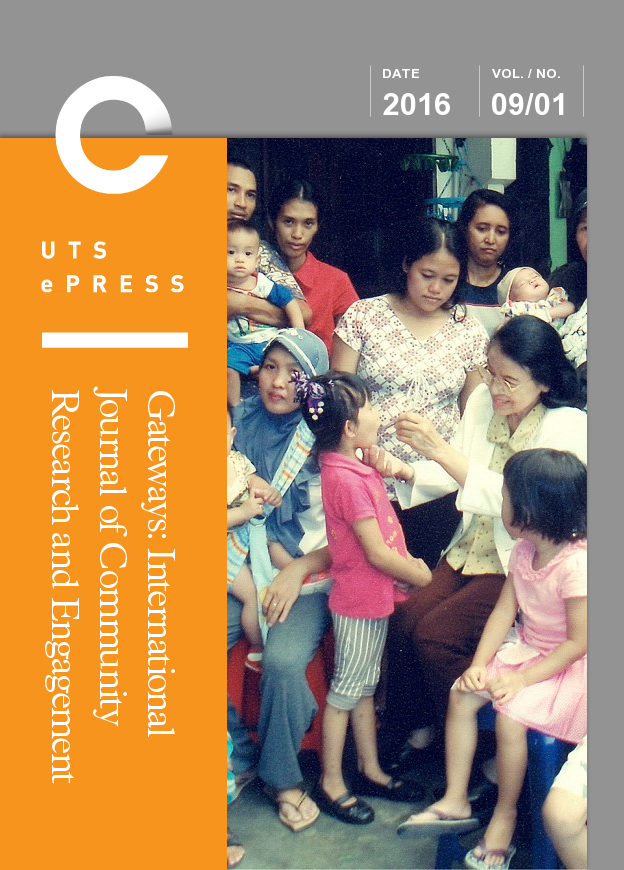Caught up in power: Exploring discursive frictions in community research
Main Article Content
Abstract
This article outlines the debate around the emancipatory claims of community-based research (CBR) and identifies discursive frictions as a pivotal point upon which much of CBR practice revolves. Using a Foucauldian theoretical lens, we suggest that CBR is neither inherently emancipatory nor repressive, but that research outcomes are more often a product of power asymmetries in CBR relationships. To illustrate how power asymmetries in research relationships produce discursive frictions, several studies from our work and the literature are presented. The article provides examples of CBR relationships between the researcher and community members and relationships within the community to illustrate how power asymmetries and discursive frictions in these relationships dynamically influence research outcomes and thus alert researchers to the need to address power asymmetries not just before initiating CBR projects, but during CBR projects as well. We interrogate how power asymmetries and discursive frictions operate and are constructed in CBR in an attempt to highlight how research might be conducted more effectively and ethically. Finally, we indicate that some of the tensions and challenges associated with CBR might be ameliorated by the use of participatory facilitation methodologies, such as photo-voice and story circle discussion groups, that draw attention to power asymmetries and purposefully use more creative participatory tools to restructure power relationships and ultimately address the inequities that exist in the research process. Because CBR is continually caught up in power dynamics, we hope that highlighting some examples might offer an opportunity for increased dialogue and critical reflection on its claims of empowerment and emancipation.
Keywords: discursive friction, Foucault, participatory methodologies, power asymmetries, research relationships, emancipatory research
Article Details
Issue
Section
Authors who submit articles to this journal from 31st March 2014 for publication, agree to the following terms:
a) Authors retain copyright and grant the journal right of first publication with the work simultaneously licensed under a Creative Commons Attribution License that allows others to share and adapt the work with an acknowledgement of the work's authorship and initial publication in this journal.
b) Authors are able to enter into separate, additional contractual arrangements for the non-exclusive distribution of the journal's published version of the work (e.g., post it to an institutional repository or publish it in a book), with an acknowledgement of its initial publication in this journal.
c) Authors are permitted and encouraged to post their work online (e.g., in institutional repositories or on their website) prior to and during the submission process, as it can lead to productive exchanges, as well as earlier and greater citation of published work (See The Open Access Citation Advantage Service). Where authors include such a work in an institutional repository or on their website (ie. a copy of a work which has been published in a UTS ePRESS journal, or a pre-print or post-print version of that work), we request that they include a statement that acknowledges the UTS ePRESS publication including the name of the journal, the volume number and a web-link to the journal item.
d) Authors should be aware that the Creative Commons Attribution (CC-BY) License permits readers to share (copy and redistribute the work in any medium or format) and adapt (remix, transform, and build upon the work) for any purpose, even commercially, provided they also give appropriate credit to the work, provide a link to the license, and indicate if changes were made. They may do these things in any reasonable manner, but not in any way that suggests you or your publisher endorses their use.
For Volume 6 (2013) and before, the following copyright applied:
Articles published by UTSePress are protected by copyright which is retained by the authors who assert their moral rights. Authors control translation and reproduction rights to their works published by UTSePress. UTSePress publications are copyright and all rights are reserved worldwide. Downloads of specific portions of them are permitted for personal use only, not for commercial use or resale. Permissions to reprint or use any materials should be directed to UTSePress.
